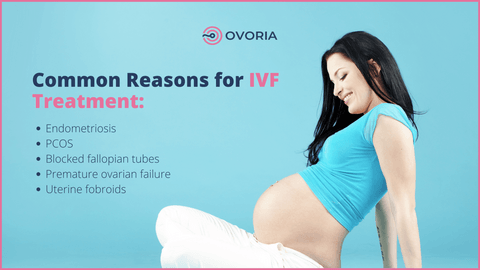Common Reasons for IVF Treatment
Sometimes, the desire to have children can be obscured because of infertility problems. It's not just serious diseases that cause infertility; a lot of the time, habits like smoking, drinking too much alcohol, and stress can cause infertility problems.
Female infertility rates are increasing. Many factors contribute to women not being able to conceive, but experts say that one of the main reasons is that women are waiting until they become older to have children. However, infertility can be a problem regardless of your age or situation.

Common Reasons For Having IVF Treatment:
Endometriosis is a condition when tissue from the inside of the uterus starts growing elsewhere in your body. The extra tissue can cause scarring and inflammation that affects nearby organs, including your ovaries, uterus, and fallopian tubes. This condition can lead to infertility in few ways:
- Pelvic toxicity causes infertility; although the reason for infertility is unknown, the mere presence of these abnormal cells changes the pelvic environment, which hinders natural conception.
- The fallopian tubes are blocked, preventing the egg from entering the uterus and ultimately, the fallopian tube
- Ovarian cysts resulting from polycystic ovarian syndrome, in turn, prevent the standard passage of the egg.
PCOS (Polycystic Ovary Syndrome)
Polycystic ovary syndrome is a hormonal condition caused by an excess of male hormones and a deficiency of female hormones. A lack of ovulation characterizes it because of the imbalance in male and female hormones.
A woman who has polycystic ovaries does not ovulate or does not ovulate regularly. They also have an excess production of androgen, which is the male hormone. This prevents them from becoming pregnant. The production of androgen can disrupt the average balance of hormones. The abnormal production of androgen in women is called PCOS.
The fallopian tubes, also known as the oviducts, are the female reproductive organs that connect the ovaries to the uterus. They carry an egg from the ovaries to the uterus during ovulation every month.
If the fallopian tubes are blocked, sperm cannot reach the egg, or if an egg is fertilized, it cannot get to the uterus. A common cause of blocked fallopian tubes is scar tissue, infection, and adhesion. If there's any damage or blockage present in the fallopian tube, the sperm and egg may not meet correctly.
Ovarian failure, also known as primary ovarian insufficiency, is when the ovaries lose their normal function of releasing a mature egg every month. A woman diagnosed with ovarian failure may have menopause at an earlier age than the average.
The Oestrogen hormone plays an essential role in releasing an egg every month. But as a woman ages, the ovaries make less oestrogen, which prevents the release of eggs and can also lead to infertility.
Uterine fibroids are non-cancerous tumours in the uterus. They occur in women during their childbearing years and are very common. Fibroids may grow on the wall of the uterus.
Fibroids may affect the implantation of the fertilized egg, making it hard to conceive.
Low Sperm Quality
A common cause of infertility is a low sperm count and motility. These issues, coupled with poor sperm quality, represent 90% of all cases of infertility in men and anywhere from 20% to 40% in couples.
Low Quality of Eggs
Often, infertility can be a result of egg quality problems caused by aging or illness. In these cases, donor eggs can be used to develop embryos, which are then transferred to the woman’s reproductive system.
Secondary Infertility is an incapability to conceive or carry a healthy pregnancy to live after previously giving birth. It usually refers to couples who were trying to conceive for six months to one year.
References:


